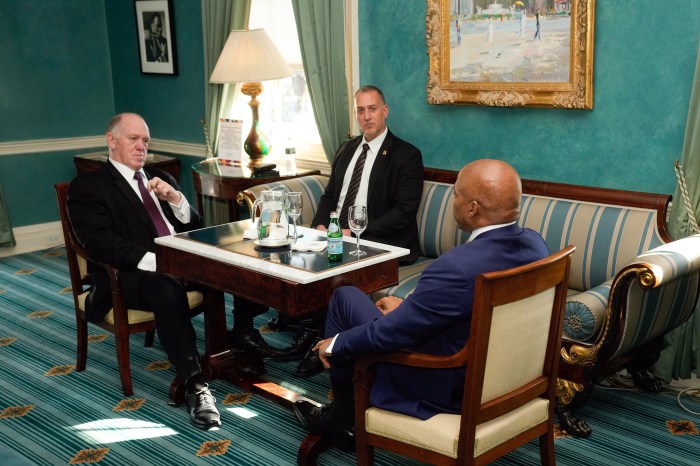The battle over a proposed ban on buying fur in New York City is getting hairy.
Animal activists and supporters of the fur industry are expected to descend on City Hall this Wednesday when the City Council holds its first hearing on the controversial legislation.
The bill would ban the sale of fur apparel in all five boroughs, unless it is a used piece of fur apparel or one worn for religious custom. It would not halt manufacturing of fur garments in the city.
Similar bans were approved in Los Angeles and San Francisco, but the fur industry has waged an aggressive public relations campaign through television advertisements, mailers and news conferences to prevent it from being enacted in one of the fashion capitals of the world.

Business owners said the ban will wipe out jobs, shutter family businesses and hurt the city’s economy.
But animal rights groups, such as People for the Ethical Treatment of Animals, have focused on what they say is the cruel treatment of animals killed for their fur.
They also have the backing of celebrities including singer Morrissey and actor Anjelica Huston as well as style guru Tim Gunn, who is expected to testify on Wednesday.
But the most important supporter is its prime sponsor — City Council Speaker Corey Johnson.
“I think killing animals for fur is morally wrong,” Johnson told amNewYork. “We are more evolved and it is unnecessary. So many designers don’t use fur so we should focus on alternatives and stop killing animals just to make luxury items.”

Nick Pologeorgis, who helps run the Manhattan-based fur business his Greek immigrant father started more than 50 years ago, said he was “devastated” when he first heard about the proposed ban.
“I couldn’t even comprehend in the United States something like this would happen,” said Pologeorgis.
He operates the eponymous firm with his sister, Joan Mathenas. They employ a staff of 20 and contract with other factories to manufacture fur coats, vests and accessories for their own label and other fashion labels.
“This will impact the factories that I give a lot of work to, the people I buy lining supplies from,” Pologeorgis said. “We do a tremendous amount of shipping through UPS and FedEx.”
Dan Mathews, a senior vice-president at PETA, has spent the last few weeks lugging around a foothold trap used to capture animals in the wild when he meets with City Council members and staff. He uses a pencil to trigger the trap which closes with a loud snap.
“Every single person I showed this to was absolutely shocked,” Mathews said. “These traps don’t just kill coyotes and foxes, they kill cats, dogs and owls – they don’t discriminate.”
Mathews said whether animals are killed on fur farms or trapped in the woods, they suffer a horrible fate. In some cases, he said, animals will chew off a paw to get out of the trap or skinned alive.
“When you do the research, even with the best practices, it’s violent and inhumane,” said Edita Birnkrant, executive director of NYCLASS, an animal welfare group that supports the ban. “I don’t think there is a way to operate an industry that mass produces a product based on removing the skins of animals in a way that is humane.”
The advent of social media has also helped anti-fur activists get their message across many platforms with graphic images and videos.
Pologeorgis said those arguments are unfair and insisted real fur is better for the environment than fake fur.
“You have to understand that trapping is needed, there is no predator for coyotes in certain areas,” he said. “We are not a cruel industry at all.”
The Fur Information Council of America is weighing legal challenges against the bans in Los Angeles and San Francisco, but will wait until they both go into effect in 2020, according to spokesman Keith Kaplan.
A 2013 lawsuit against West Hollywood’s fur ban was eventually dismissed but the law was changed to allow the sale of fur legally trapped in the state of California.
The fur industry got a boost last week when a group of African-American religious leaders added their voices to the debate, saying fur is an important part of their heritage and culture because it helped signify status and was a source of pride.
“(The proposed ban) is insensitive to our culture and to those of us who like to show up for worship draped in our fur and mink coats,” said the Rev. Dr. Johnnie Green of Mount Nebo Baptist Church told the crowd.
Green also said it would be unfair to make city residents shop outside the five boroughs to purchase fur items.
The fine for violating the ban can be up to $500 for the first violation and up to $1,500 for subsequent violations.
“We are not banning the manufacturing of fur, we are not banning the wearing of fur,” Johnson said. “We are saying New York should not be a large market that creates demand.”





































